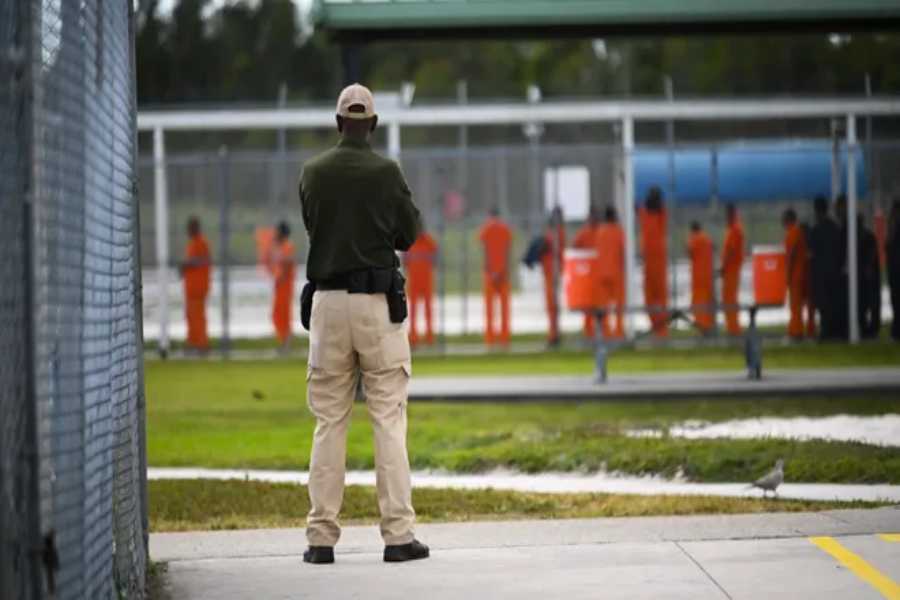Immigrant women held at the Krome North Processing Center in Miami are alleging mistreatment and inhumane conditions inside U.S. Immigration and Customs Enforcement (ICE) custody, raising fresh concerns over detainee treatment amid the Trump administration’s aggressive immigration crackdown.
Four women detained in February at Krome — a facility typically reserved for male detainees — have come forward to describe what they endured during their time in custody. All four were held for alleged immigration violations but had no criminal background, according to a review of law enforcement records. They detailed their experiences in audio recordings and interviews, including long hours chained on prison buses, sleeping on concrete floors in overcrowded cells, and being denied access to basic hygiene and medical care.
The allegations include being shackled at the wrists, waist, and chest for up to 12 hours during transportation without access to food, water, or bathrooms. Guards, they say, told them to relieve themselves on the floor. “They chained my chest super-tight, and I couldn’t breathe properly,” one woman said in a recorded testimony. “It was very scary.”
Upon arrival at Krome, the women said they were rushed past male dormitories, where men pressed their faces against the glass. “It was like we were zoo animals,” said another woman. Inside, they were placed in cramped holding cells, some with as many as 27 women. “Like sardines in a jar,” one described.
The accounts suggest a rapid deterioration of conditions at Krome, one of 130 ICE detention centers in the U.S. The privately operated facility, run by Akima Infrastructure Protection under a $685 million contract, was the subject of a previous Department of Homeland Security (DHS) report highlighting systemic problems across multiple ICE centers, including inadequate medical care and failure to meet basic standards.
ICE’s current detention population has surged past its capacity, with over 46,000 people in custody despite an official limit of 41,500. The overcrowding at Krome, legal experts say, is part of the fallout from a shift to more aggressive enforcement under President Trump.
The administration has increased pressure to detain and deport immigrants at a rapid pace, attempting to scale up capacity by proposing new detention facilities, including a 30,000-bed complex at Guantanamo Bay and expansion on military bases. ICE is also working to lower federal detention standards, potentially allowing local law enforcement to hold detainees under less rigorous state guidelines.
“Guards themselves have said, ‘It shouldn’t be like this,’” said Mich González, an immigration attorney representing the family of a Ukrainian man who died at Krome in February. A second detainee died there just a month earlier.
All four women say they received minimal access to water and food, describing how they had to bang on cell windows for a paper cone of water or wait over a day for a basic meal. “One woman said she was fed nothing for 36 hours,” a relative of one detainee confirmed.
The women also reported delayed or denied medical attention and limited access to hygiene products. One described developing a rash after going days without bathing, only to be told by guards she’d need to fake a seizure to receive treatment. “That’s what they said — pretend to fall,” she said in her audio recording.
Sanitary needs were reportedly unmet. Another woman described watching a fellow detainee wait 12 hours for two sanitary napkins during her period. All four detainees said they were offered only one brief shower during their multi-day detention and had no privacy in cells monitored by security cameras.
Despite the conditions, the women remain in custody. Fearing retaliation, they requested anonymity. Their accounts have been corroborated by family members, attorneys, and independent legal observers who visited Krome during this time.
The allegations raise serious questions about the administration’s push to expand detention capacity while simultaneously lowering standards. DHS and ICE did not respond to multiple requests for comment from USA TODAY, which first reported the women’s stories.
Congress recently approved a $430 million budget increase for ICE detention operations. Immigration advocates warn that the government is preparing for mass expansion — possibly at the expense of human rights.
ICE claims its detention system is “non-punitive,” recognizing that immigration violations are civil, not criminal. But advocates argue the reality is far different. “They have plans to build new facilities,” said González. “But in the meantime, they are overcrowding the existing ones — and people are suffering.”
The women’s testimonies add to a growing list of reports alleging mistreatment in ICE custody. Over the past three years, federal inspections have repeatedly found consistent failures at detention centers across the country, spanning both the Biden and Trump administrations.
“We are treated like animals,” one detainee said. “No one cares. Not about us, not about what we’re going through. We’re invisible.”
As immigration enforcement ramps up and detention populations grow, advocates and legal experts are calling for immediate investigations and meaningful reforms. Whether federal authorities will act remains uncertain. In the meantime, detainees like these four women continue to wait — in overcrowded cells, without basic rights, and with little hope for change.

